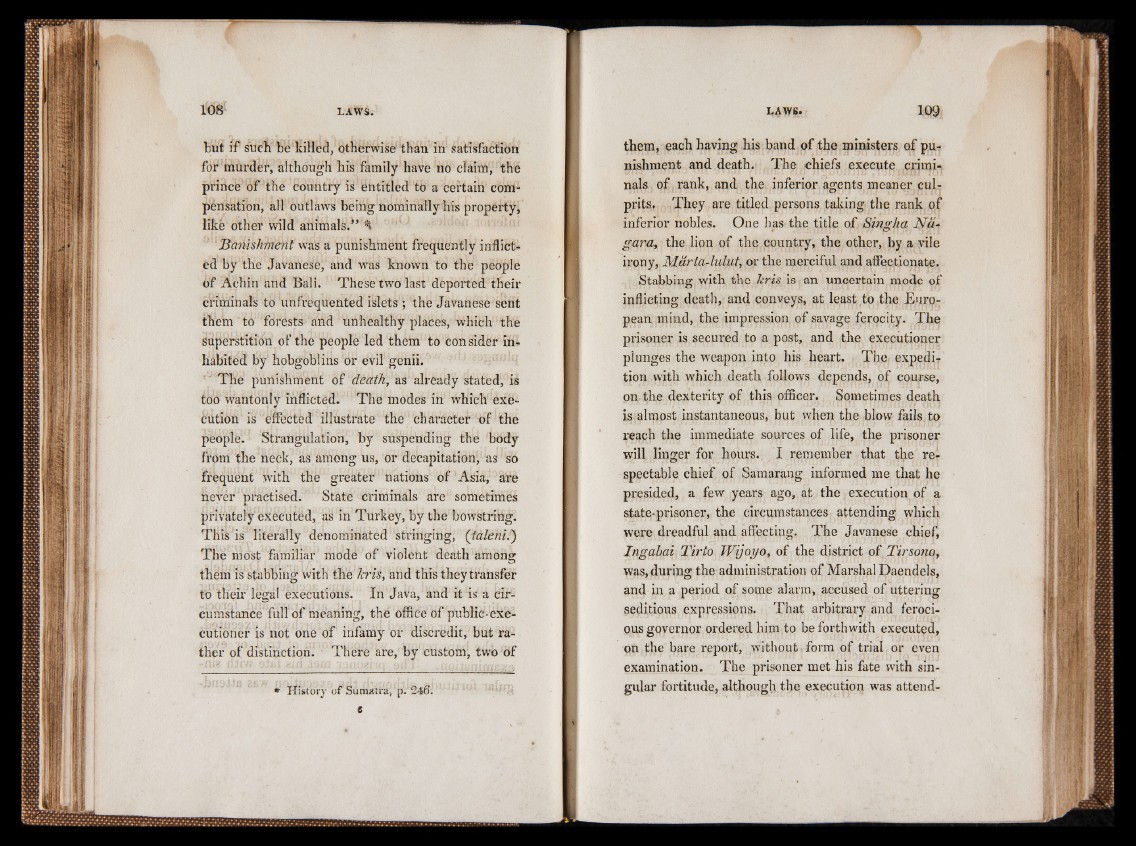
but if such be killed, otherwise than in satisfaction
for murder, although his family have no claim, the
prince of the country is entitled to a certain compensation,
all outlaws being nominally his property,
like other wild animals.” %
Banishment was a punishment frequently inflicted
by the Javanese, and was known to the people
of Achin and Bali. These two last deported their
criminals to unfrequented islets ; the Javanese sent
them to forests and unhealthy places, which the
superstition of the people led them to consider inhabited
by hobgoblins or evil genii.
The punishment of death, as already stated, is
too wantonly inflicted. The modes in which execution
is effected illustrate the character of the
people. Strangulation, by suspending the body
from the neck, as among us, or decapitation, as so
frequent with the greater nations of Asia,1 are
never practised. State criminals are sometimes
privately executed, as in Turkey, by the bowstring.
This is literally denominated stringing, (ialeni.J
The most familiar mode of violent death among
them is stabbing with the leris, and this theytransfer
to their legal executions. In Java, and it is a circumstance
full of meaning, the office of public-executioner
is not one of infamy or discredit, but rather
of distinction. There are, by custom, two of
* History of Sumatra, p. 246.
c
them, each having his band of the ministers of punishment
and death. The chiefs execute criminals
of rank, and the inferior *aOgents meaner culprits.
They are titled persons taking the rank of
inferior nobles. One has the title of Singha Na-
gara, the lion of the country, the other, by a vile
irony, Marta-lidut, or the merciful and affectionate.
Stabbing with the kris is an uncertain mode of
inflicting death, and conveys, at least to the European
mind, the impression of savage ferocity. The
prisoner is secured to a post, and the executioner
plunges the weapon into his heart. The expedition
with which death follows depends, of course,
on the dexterity of this officer. Sometimes death
is almost instantaneous, but when the blow fails to
reach the immediate sources of life, the prisoner
will linger for hours. I remember that the re-
spectable chief of Samarang informed me that he
presided, a few years ago, at the execution of a
state-prisoner, the circumstances attending which
were dreadful and affecting. The Javanese chief,
Ingabai Tirto Wijoyo, of the district of Tirsono,
was, during the administration of Marshal Daendels,
and in a period of some alarm, accused of uttering
seditious expressions. That arbitrary and ferocious
governor ordered him to be forthwith executed,
on the bare report, without form of trial or even
examination. The prisoner met his fate with singular
fortitude, although the execution was attend